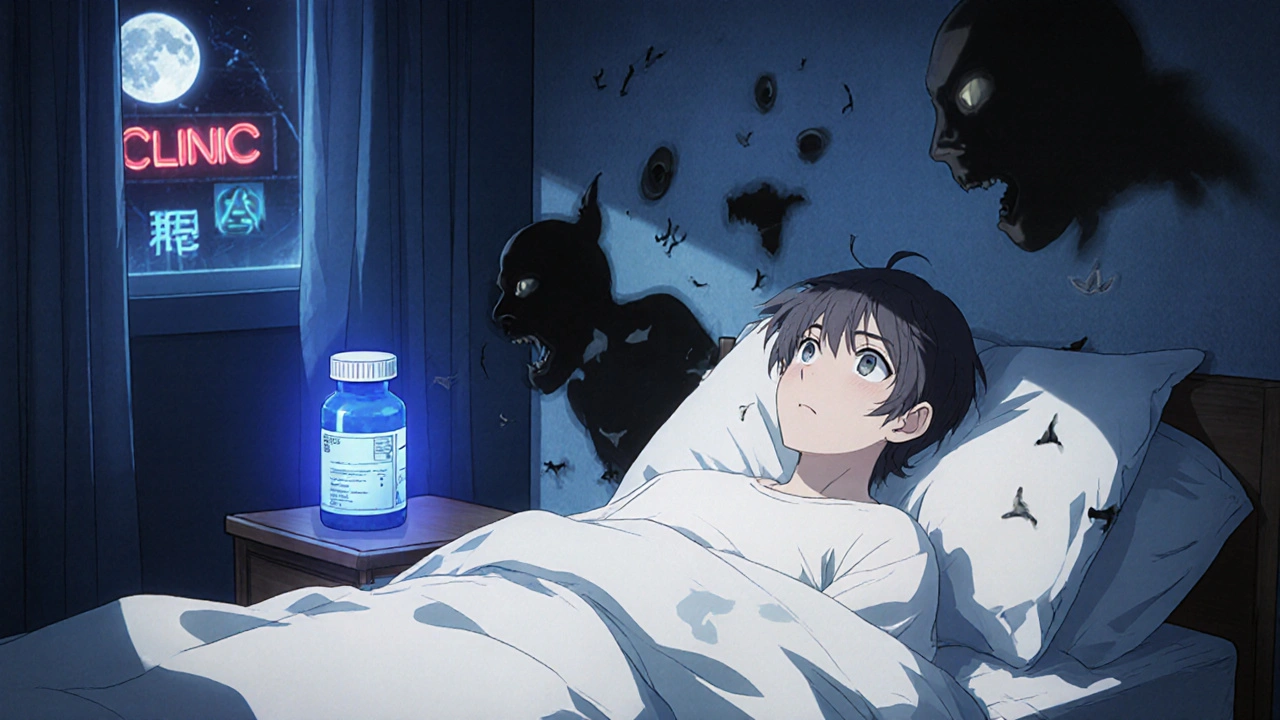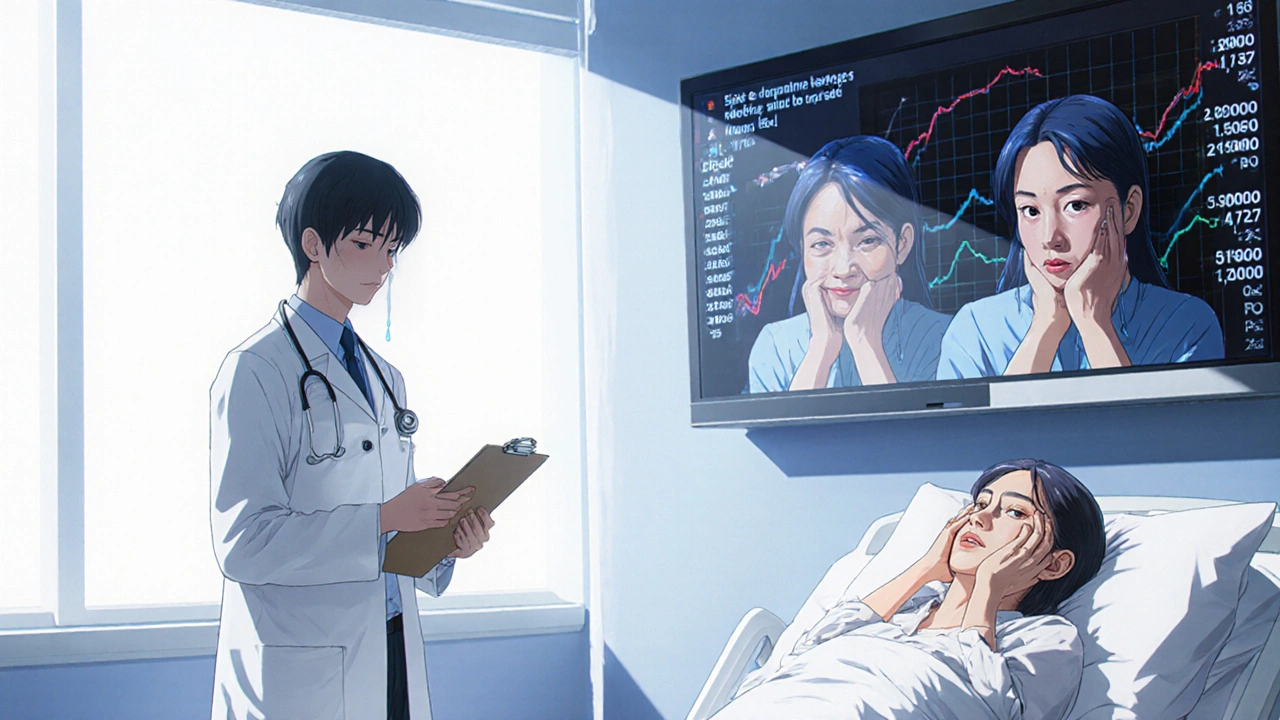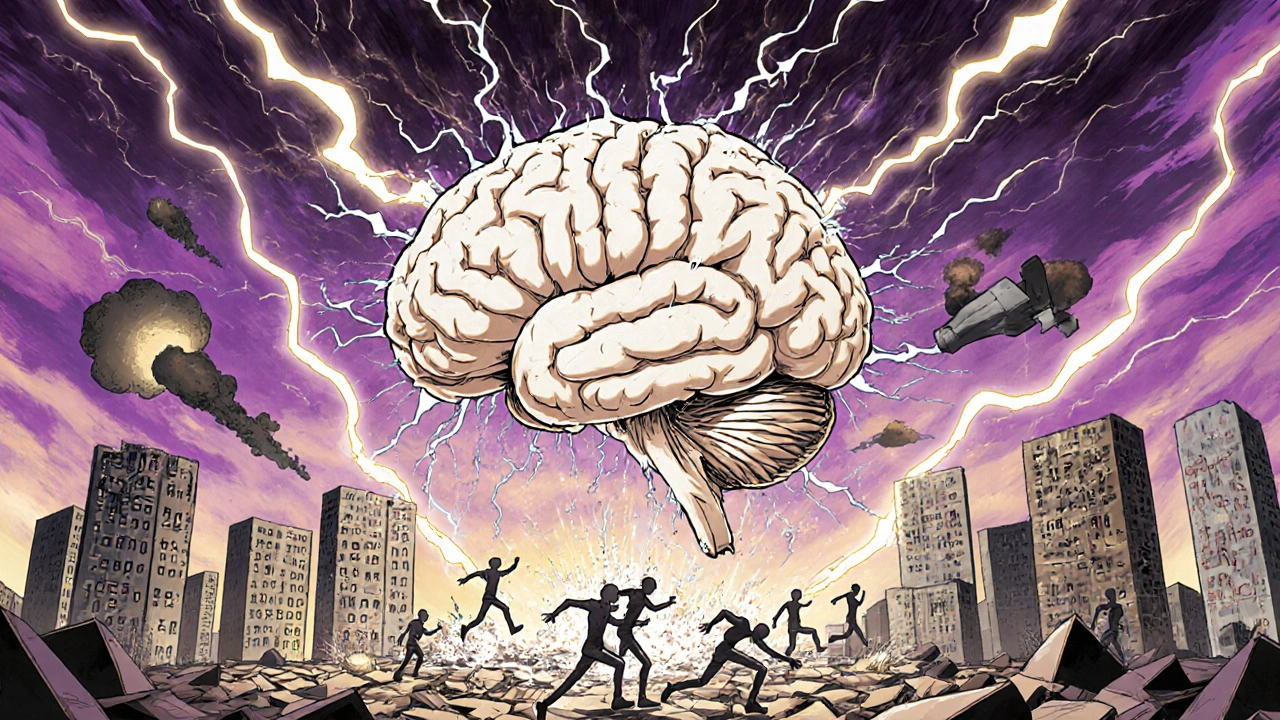
Corticosteroid Psychosis Risk Calculator
This tool helps you assess your personal risk of developing psychiatric side effects from corticosteroid medications based on key factors discussed in the article. Note: This is for educational purposes only and should not replace professional medical advice.
Personal Risk Factors
What to Watch For
- Unusual mood changes (euphoria, agitation, or depression)
- Sudden insomnia despite exhaustion
- Confusion or memory problems
- Unexplained paranoia or suspicious thoughts
- Hallucinations (seeing, hearing, or feeling things that aren't there)
- Disorganized speech or behavior
When you take corticosteroids for asthma, rheumatoid arthritis, or a flare-up of lupus, you’re usually focused on the physical relief-less swelling, easier breathing, reduced pain. But what no one tells you upfront is that these powerful drugs can also change how you think, feel, and even behave. For some people, the side effects aren’t just fatigue or weight gain. They’re confusion, rage, hallucinations, or a sudden, overwhelming sense of euphoria that doesn’t match what’s happening in their life. This isn’t rare. It’s not just "in your head." It’s a real, documented reaction called corticosteroid-induced psychosis.
How Common Are These Changes?
Think about this: doctors in the U.S. write about 10 million new prescriptions for oral corticosteroids every year. That’s millions of people taking prednisone, methylprednisolone, or dexamethasone. And between 5% and 18% of them will develop noticeable psychiatric symptoms. That’s one in every five to ten people. At lower doses-under 40 mg of prednisone per day-the risk is around 1.3%. But when the dose jumps to 80 mg or more? The risk nearly quadruples to 18.4%. The higher the dose, the higher the chance. And it doesn’t matter if you’ve taken steroids before. One month you’re fine. The next, you’re hearing voices or believing your family is plotting against you.
What Do These Changes Look Like?
It’s not just "feeling down." The spectrum is wide and often misunderstood. Some people feel unusually happy-euphoric, even reckless. That’s reported in nearly 28% of cases. Others can’t sleep, no matter how tired they are. Insomnia hits over 42% of patients. Mood swings are common too-sudden crying, anger outbursts, or feeling emotionally numb. Personality changes? That’s 29% of people. They might become suspicious, withdrawn, or act completely out of character.
Then there’s the serious stuff: psychosis. That means losing touch with reality. Delusions-believing things that aren’t true. Hallucinations-seeing, hearing, or feeling things that aren’t there. Disorganized speech or behavior. In rare cases, catatonia. About 5% to 18% of people on high-dose steroids develop these symptoms. And here’s what’s scary: it can happen even if you’ve never had a mental illness before. You don’t need a history of depression or bipolar disorder to be affected.
Memory problems are another big one. People report struggling to remember names, appointments, or even what they just said. This isn’t just forgetfulness-it’s a measurable decline in verbal and declarative memory, linked to how steroids affect the hippocampus, the brain’s memory center.
When Do Symptoms Start?
Most people don’t notice anything for the first few days. But symptoms usually show up within the first week. The median time? Three to four days after starting the medication. That’s why it’s so easy to miss. If you’re on steroids for a bad flare-up, you assume your irritability or sleeplessness is just stress from being sick. But if you’re suddenly convinced your neighbor is spying on you-or you’re dancing around the house at 3 a.m. because you feel like you’re on top of the world-that’s not stress. That’s your brain reacting to the drug.
And here’s something most doctors don’t warn you about: symptoms can show up even after you stop taking the steroid. There are documented cases where psychosis or mania lasted for weeks after the last pill. That means the damage isn’t always reversible just by quitting the drug. The brain needs time to reset, and sometimes, it needs help.

Who’s Most at Risk?
It’s not random. Certain people are far more likely to have these reactions.
- Women are more susceptible than men, across multiple studies.
- People over 65 have a higher risk-older brains are more sensitive to hormonal changes.
- Those with a history of bipolar disorder, depression, or anxiety are at much greater risk. If you’ve had a psychotic episode before, steroids can trigger it again.
- High-dose, long-term use is the biggest red flag. Taking 80 mg of prednisone for two weeks? That’s a danger zone.
It’s not about being "weak" or "sensitive." It’s biology. Steroids flood your system and interfere with neurotransmitters-especially dopamine. Animal studies show steroids boost tyrosine hydroxylase, the enzyme that makes dopamine. Too much dopamine? That’s a known trigger for psychosis. Add in the suppression of your natural stress-response system (the HPA axis), and you’ve got a perfect storm in the brain.
What Should You Do If You Notice Changes?
Don’t wait. Don’t assume it’ll pass. Don’t blame yourself.
If you or someone you care about starts showing signs-confusion, agitation, hallucinations, extreme mood swings, or sudden insomnia-tell your doctor immediately. Bring this list with you. Don’t say, "I feel weird." Say: "I think the steroids are making me lose touch with reality." The first step is almost always lowering the dose. If you’re on 80 mg, can you drop to 40 mg? Often, symptoms improve dramatically. In fact, 92% of patients see full recovery once the dose is reduced below the danger threshold.
But what if you can’t lower the dose? What if your lungs or kidneys need that high dose to stay stable? Then you need help from a psychiatrist. There’s no FDA-approved drug for steroid-induced psychosis-but doctors use antipsychotics off-label with good results:
- Haloperidol: 0.5 to 1 mg per day
- Olanzapine: 2.5 to 20 mg per day
- Risperidone: 1 to 4 mg per day
Symptoms usually start lifting within days. Lithium has been used to prevent mania, but it’s risky-kidney and thyroid side effects make it a last-resort option. Always involve a psychiatrist. This isn’t something to manage alone.

Why Is This So Often Missed?
Because it’s not on the checklist. Most patients get handed a prescription with a list of side effects: weight gain, high blood sugar, upset stomach. Psychosis? Sometimes it’s buried under "mood changes" or "rarely, psychiatric symptoms." Even doctors forget. A pulmonologist treating COPD might not think to ask about sleep or mood. A rheumatologist focused on joint pain might miss signs of delusions.
And when symptoms do show up? They’re often misdiagnosed. A patient with steroid-induced psychosis might be labeled "noncompliant," "hysterical," or "depressed." But if you don’t test for steroid toxicity, you’ll treat the wrong thing. The key is this: steroid-induced psychosis is a diagnosis of exclusion. You have to rule out everything else-drug use, infections, brain tumors, metabolic imbalances-before you can say it’s the steroid.
What’s Missing in Current Care?
There’s no standard screening tool. No blood test. No quick checklist doctors use routinely. That’s a huge gap. We know the risk factors. We know the timeline. We know the symptoms. But we don’t have a simple way to catch it early.
Experts are calling for "clinimetric methods"-simple, validated tools that nurses or pharmacists can use to track mood, sleep, and behavior in patients on steroids. Imagine a one-page form you fill out every three days: "Have you felt unusually happy or irritable? Have you heard voices? Have you had trouble remembering things?" That could save lives.
And we need more research. Why do some people recover quickly after stopping steroids, while others stay psychotic for weeks? Why do symptoms sometimes linger? Is there a genetic vulnerability? Are there biomarkers we can test for? Right now, we’re flying blind.
What You Can Do Right Now
If you’re on corticosteroids:
- Ask your doctor: "What’s my dose in prednisone equivalents? Is it above 40 mg/day?"
- Ask your pharmacist: "What are the psychiatric side effects I should watch for?"
- Keep a daily journal: note your mood, sleep, memory, and any strange thoughts.
- Tell a family member: "If I act completely different, please tell my doctor."
- Don’t stop the steroid on your own. Tapering too fast can be dangerous.
If you’re caring for someone on steroids:
- Watch for sudden changes in personality or behavior.
- Don’t dismiss confusion or paranoia as "just being tired."
- Bring up the topic even if the patient doesn’t mention it.
- Request a psychiatric consult if symptoms appear.
This isn’t about scaring you away from steroids. They save lives. But they’re not harmless. The more we understand the mental risks, the better we can protect people who depend on them.
Can corticosteroids cause psychosis even if I’ve never had a mental illness?
Yes. Corticosteroid-induced psychosis can happen to anyone, regardless of mental health history. It’s a direct biological reaction to high doses of the drug, not a recurrence of a past condition. About 23.5% of documented cases involve psychosis without any prior psychiatric diagnosis.
How long do steroid-induced psychiatric symptoms last?
For most people, symptoms improve within days to weeks after lowering the dose or stopping the steroid. But in some cases, symptoms-especially mania or psychosis-can persist for weeks or even months after discontinuation. This is why medical supervision is critical even after the last pill.
Are there any medications approved to treat steroid-induced psychosis?
No. There are currently no FDA-approved drugs specifically for corticosteroid-induced psychosis. Doctors use antipsychotics like olanzapine, risperidone, or haloperidol off-label, based on clinical evidence from case studies and small trials. These are often effective, but they’re not designed for this use.
Can I still take corticosteroids if I have a history of depression or bipolar disorder?
Yes, but with extreme caution. If you have a history of bipolar disorder, depression, or psychosis, your risk of steroid-induced episodes is significantly higher. Your doctor should consider lower doses, shorter courses, and possibly involve a psychiatrist before starting treatment. Never stop a steroid without medical guidance-even if you feel worse.
Should I avoid corticosteroids altogether because of the risk?
No. Corticosteroids are life-saving for many conditions, including severe asthma, autoimmune diseases, and certain cancers. The risk of psychosis is real but manageable. The key is awareness, monitoring, and open communication with your care team. Avoiding steroids could be far more dangerous than using them responsibly under supervision.

Bonnie Youn
November 28, 2025 AT 09:26Just got off 60mg of prednisone last week and I swear I thought my cat was talking to me. Not joking. I told my husband I heard her say "feed me" in a British accent. Turns out I was just sleep-deprived and high on steroids. This post saved my sanity. Tell your doctor. Don't wait.
Edward Hyde
November 28, 2025 AT 10:58So let me get this straight. Big Pharma doesn't wanna tell you your brain might melt but they'll sell you a 30-day supply of prednisone like it's Advil? Classic. They know people are too damn tired to read the tiny print so they bury psychosis under "mood swings" like it's a side effect you can just shrug off. Wake up people.
Charlotte Collins
November 28, 2025 AT 21:11It's not that the risk is understated-it's that the medical system is structurally incapable of acknowledging neurochemical side effects in chronic illness patients. We're treated as walking organ systems, not whole human beings with vulnerable limbic systems. The data exists. The mechanisms are documented. But the culture of "tough it out" persists because acknowledging this would require systemic change-and nobody wants to pay for that.
Margaret Stearns
November 30, 2025 AT 19:10I took steroids after my knee surgery and I was crying for no reason and couldn't remember my kid's birthday. I thought I was going crazy. Turns out I was just on 40mg. My nurse said "it happens more than you think" and I cried harder because someone finally got it. Please talk to your providers. You're not broken.
amit kuamr
November 30, 2025 AT 22:46Scotia Corley
December 2, 2025 AT 18:39It is imperative to underscore that corticosteroid-induced psychiatric phenomena constitute a well-documented iatrogenic entity, the clinical recognition of which remains suboptimal due to diagnostic overshadowing. The absence of standardized screening protocols constitutes a critical gap in patient safety infrastructure.
elizabeth muzichuk
December 3, 2025 AT 10:04They know. They ALL know. Big Pharma, the FDA, your doctor-they’re all in on it. Why? Because if people realized steroids could turn them into a paranoid, hallucinating mess, they’d stop taking them. And then what? No profits. No power. They’d rather let you lose your mind than lose a dollar. This isn’t medicine. It’s control.
Debbie Naquin
December 3, 2025 AT 14:45The dopaminergic cascade triggered by glucocorticoid receptor modulation in the mesolimbic pathway is a neurobiological inevitability under supraphysiological exposure. The hippocampal atrophy observed in fMRI studies correlates with declarative memory deficits, suggesting a transient but functionally significant neurotoxicity. The real question isn't whether it happens-it's why we're still treating it as an outlier rather than a predictable pharmacodynamic outcome.
Karandeep Singh
December 3, 2025 AT 19:39Mary Ngo
December 5, 2025 AT 11:32They’re using steroids to control the population. The government knows this side effect is common. They’re letting it happen so people become paranoid and divided. Look at the stats-most patients are women and seniors. That’s not coincidence. That’s targeting. Who benefits when people distrust their own minds?
James Allen
December 6, 2025 AT 09:03Man I had this happen to me after my COPD flare. Thought my wife was cheating on me with the mailman. I was so mad I almost punched the dog. Then I realized-I hadn’t slept in 3 days and I was hearing my own voice echo. I told my doc and they dropped my dose. I’m alive because I spoke up. Don’t be like me. Don’t wait until you’re yelling at the TV.
Kenny Leow
December 7, 2025 AT 08:26As someone from Singapore, I’ve seen this in elderly patients here too. Families think it’s dementia. Doctors think it’s aging. No one thinks steroid. We need awareness campaigns. Maybe a poster in pharmacies? "Your mood isn’t you-it’s your meds." Simple. Effective.
Kelly Essenpreis
December 9, 2025 AT 04:27Oh please. This is just woke medicine. Next they’ll say caffeine causes existential dread. I’ve been on steroids for 10 years. Never had a problem. You’re all just looking for reasons to be dramatic.